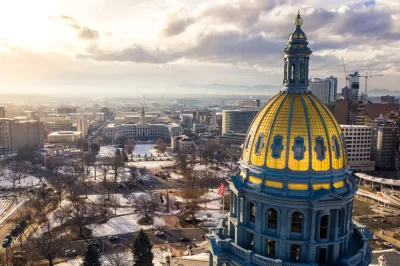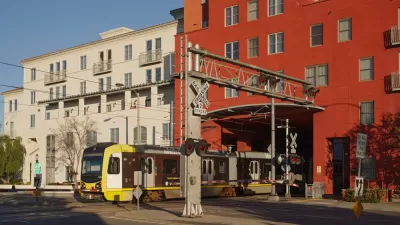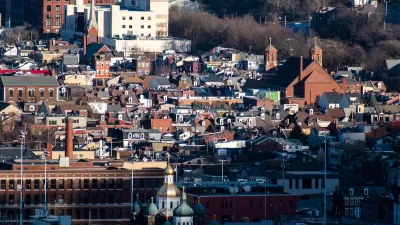The proposed law would require cities to meet certain housing targets near transit or risk losing access to a key state highway fund.

A proposed state bill in the Colorado legislature would wield the state’s financial power to encourage transit-oriented development (TOD).
As Andrew Kenney explains for CPR News, HB24-1313 would cut off access to the state’s Highway Users Tax Fund (HUTF), which funds transportation infrastructure, to cities that don’t allow dense development near transit. “The bill sets a target number of housing units for each city, based on how many miles of high-frequency bus and train lines cross the city. The cities would then have to ensure that they have ‘zoning capacity’ for that level of density near transit lines — basically, that their own development rules aren’t preventing builders from reaching those targets.”
The bill would apply to cities that have high-frequency bus or rail service and includes some incentives including tax credits for affordable housing.
Critics of the bill say it amounts to regulatory overreach and could pose a danger to Coloradans traveling on local roads if cities have to cut back on maintenance and services like snow plowing. “If the HUTF provision were to be removed, the law still could include legal requirements for cities to revise their zoning, but the state would have one less option to gain compliance.”
FULL STORY: In a push for more housing density near transit lines, highway dollars have become a political football

Trump Administration Could Effectively End Housing Voucher Program
Federal officials are eyeing major cuts to the Section 8 program that helps millions of low-income households pay rent.

Planetizen Federal Action Tracker
A weekly monitor of how Trump’s orders and actions are impacting planners and planning in America.

Ken Jennings Launches Transit Web Series
The Jeopardy champ wants you to ride public transit.

Rebuilding Smarter: How LA County Is Guiding Fire-Ravaged Communities Toward Resilience
Los Angeles County is leading a coordinated effort to help fire-impacted communities rebuild with resilience by providing recovery resources, promoting fire-wise design, and aligning reconstruction with broader sustainability and climate goals.

When Borders Blur: Regional Collaboration in Action
As regional challenges outgrow city boundaries, “When Borders Blur” explores how cross-jurisdictional collaboration can drive smarter, more resilient urban planning, sharing real-world lessons from thriving partnerships across North America.

Philadelphia Is Expanding its Network of Roundabouts
Roundabouts are widely shown to decrease traffic speed, reduce congestion, and improve efficiency.
Urban Design for Planners 1: Software Tools
This six-course series explores essential urban design concepts using open source software and equips planners with the tools they need to participate fully in the urban design process.
Planning for Universal Design
Learn the tools for implementing Universal Design in planning regulations.
Ada County Highway District
Clanton & Associates, Inc.
Jessamine County Fiscal Court
Institute for Housing and Urban Development Studies (IHS)
City of Grandview
Harvard GSD Executive Education
Toledo-Lucas County Plan Commissions
Salt Lake City
NYU Wagner Graduate School of Public Service





























